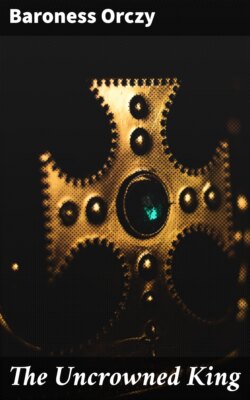Читать книгу The Uncrowned King - Baroness Orczy - Страница 9
На сайте Литреса книга снята с продажи.
2
ОглавлениеTable of Contents
Outside it was raining hard. One of those storms of wind and rain for which springtime in Northern France is ingloriously famous. There had been a few warm days in March and the beginning of April had been lovely, but now this treacherous month was going out like a roaring lion, with bitter blasts and cold douches in his train, and the young buds on the chestnut trees which had taken a premature peep at the spring, shivered and shrivelled inside their gummy husks.
Every time a fresh customer entered the restaurant a blast of cold air swept right through the room. But as the room was very much overheated and the atmosphere, consisting of the fumes of hot food, and of drink mixed with perspiring humanity, escaping gas and Camembert cheese, had become very rank, the blast of cold air had its merits.
The dinner-hour was coming to an end, the little terrines stood mostly empty on the tables; empty wine bottles lay on their sides; the waiter brought steaming cups of coffee along, and went the round with an immense bottle of Armagnac covered with the dust and cobwebs of ages. Tongues were now loosened. The talk for the most part among these artists and workers was of one another. Abuse of each other’s work, disparaging remarks, sarcastic comments marked the real admiration which all these great men had for one another.
At the table by the window Eugène Delacroix was sipping his coffee, into which he had tipped a large glass of Fine. He nodded in the direction where old man Ingres sat eating Tripes à la mode de Caen.
“Have you seen Ingres’s work this year?” he remarked to Horace Vernet, his table companion, and went on with a shrug: “I don’t think it is bad, do you?”
Horace Vernet gave a jump and nearly swallowed a piece of goose the wrong way. When he had done coughing and spluttering he exclaimed hotly:
“Not bad? Not— Man alive, are you mad or drunk? Ingres is the greatest artist of our century—the greatest genius France can boast of—”
Delacroix did not endorse this opinion apparently, for he remarked, with a slightly contemptuous lift of his bushy eyebrows:
“Are you such an admirer of his draughtsmanship as all that?”
“Not I,” Vernet replied with an equal measure of contempt: “Ingres draws like a defective chimney.”
“You like his colour then?”
Vernet shrugged.
“Ingres’s colour?” he retorted. “Ingres’s colour always reminds me of a half-baked brioche.”
“You are not going to say that his grouping—”
“Don’t talk to me of his grouping. His ‘Apotheose de Homère’ reminds one of the inside of a pantechnicon van.”
Delacroix could not help laughing.
“You don’t like his drawing, his colour or his composition,” he said lightly, “and yet you call him the greatest artist of the century.”
“Well,” his friend retorted conclusively, “he is. There is no getting away from that.”
And he turned his full attention once more to his cassoulette.
A moment or two later he looked over his shoulder and spoke to Alexandre Dumas.
“Just imagine,” he said, “that fellow Delacroix, whose women’s legs always look like the hambones of an ill-fed pig, daring to pass remarks on old Ingres’s work.”
“Jealousy perhaps,” quoth old Dumas, who had listened to the discussion with a twinkle in his beady black eyes.
“As you say,” Vernet asserted. “Now look at me. I haven’t a spark of jealousy in my composition, and I am always ready to pay homage to the genius of my colleagues.”
He turned to have a talk with Gustave Flaubert, while Delacroix spoke in his turn across to old Dumas.
“Poor old Vernet,” he remarked with a shrug. “He thinks he can paint.”
Dumas, that prince of malice, made no comment on that. He half rose from his seat and cast a searching glance across the room.
“Are you looking for anyone?” Delacroix asked him.
“I am looking for Ingres. I am longing to ask his opinion of your latest picture at the Salon.”
Ingres rose from the table just then without as much as a nod to his young vis-à-vis and came across the room, with a cup of coffee in his hand. He came to a dead halt beside the table at which Delacroix was still sitting. He said without any preamble, and at the top of his voice:
“Draughtsmanship, Delacroix, is the glory of art; to neglect it is to dishonour what we all worship.”
He was so excited over this pronouncement of his, that his hand shook and he upset his coffee, not only over the table but all over Vernet’s numerous decorations. But this did not worry him in the least. He put down his coffee cup, strode rapidly back across the room, picked up his hat and clapped it on his head and went out of the restaurant without a glance or a nod to anybody. Vernet was still engaged in wiping the coffee off his medals.
“Old camel,” he shouted at the top of his voice, as Ingres disappeared through the swing doors.
Such was the Restaurant des Trois Rois in the Cité du Réaumur, in this memorable year 1860.
